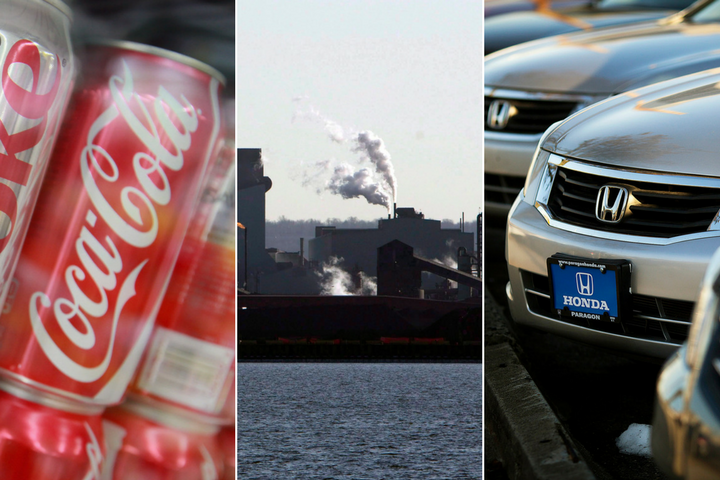U.S. President Donald Trump said Monday that Canada may be exempt from its new steel and aluminum tariffs — if the revised North American Free Trade Agreement (NAFTA) is “fair.”

READ MORE: Donald Trump warns Canada won’t get a break on steel tariffs without ‘fair’ NAFTA deal
But that hasn’t stopped those both north and south of the border from being concerned about the possible implications of the tariffs, which would also apply to countries around the world. Worry over a possible trade war also led the Dow Jones to slump for a fifth day Monday morning.
But how will the steel tariffs, if imposed on Canada, affect the country? Here’s a look at the jobs, products and regions that could take a hit.
WATCH: Finance minister mum on whether Canada will retaliate against U.S. steel tariffs

Heavily steel-dependent Canadian communities
In an email to Global News, the director of trade and economic affairs at the Canadian Steel Producers Association (CSPA), Sean Young-Steinberg, highlighted three Canadian cities that are heavily dependent on the steel industry — Sault Ste. Marie, Ont., Hamilton, Ont., and Sorel-Tracy, Que.
Canadian steel exports directly support 20,000 jobs, according to the CSPA.
READ MORE: Trump’s tariff announcement leaves Canadian steel, aluminum producers in limbo
Hamilton, which is often dubbed “Steel City,” has about 10,000 residents working in the industry. It produces about a third of the Canadian steel that’s exported to the U.S.
Keanin Loomis, CEO at the Hamilton Chamber of Commerce, explained why that’s significant: “That represents about $2 billion in local procurement, and conservatively that means there are about 30,000 other jobs that are reliant upon the steel industry here in Hamilton. Just in Hamilton.”
WATCH: Steel tariffs could hit Hamilton economy hard

Walid Hejazi, an associate professor of international business at the University of Toronto, said Hamilton will be “ground zero” when it comes to the impact of tariffs.
“But basically, wherever there are plants producing steel, they will be directly impacted,” he said. “It’s very likely that for many people who work in those facilities jobs will be at risk.”
READ MORE: Here’s what you need to know about Trump’s plan for steel, aluminum tariffs
Other jobs and industries affected
Hejazi explained that beyond the steel industry, practically every other company that deals with steel and aluminum in some capacity will be affected. The severity depends on how much of the material they use.
“Every industry that uses steel is going to see the cost go up, and they’re going to have to respond in some way,” he said, explaining that could affect jobs, materials used in products and prices.
Which products may cost more?
Any steel or aluminum product imported from the U.S. will be at an increased price to Canadians under the new tariffs — that could apply to anything from refrigerators to canned drinks.
“The price of everything in the U.S. that has steel in it, the prices will go up. When Canadians import products from the U.S. that have steel in them, they’ll pay a higher price,” Hejazi said.
He added companies will mark up prices for products almost immediately in anticipation of higher production costs.
Several interest groups and companies have already spoken out, indicating this is what they will do.
COMMENTARY: Donald Trump’s tariff threat shows his ignorance of international trade
Automobiles
Major automakers have spoken out against steel and aluminum tariffs, saying the added production costs will lead to more expensive cars. Companies such as Honda, Ford and Toyota have all penned statements.
One released by Honda last week read: “Imprudent tariffs imposed on imported steel and aluminum would raise prices on both domestic and imported products, thus causing an unnecessary financial burden on our customers.”
WATCH: Trudeau to let Trump know proposed steel tariffs ‘unacceptable’

Canned products
Trump’s aluminum tariff could have another range of effects on the prices. For example, products packaged in the material could cost more.
Last week, a letter released jointly by several organizations whose products are packaged in aluminum — including PepsiCo, Coca-Cola, the Beer Institute, etc. — warned that tariffs would make it more expensive to brew and package beer.
READ MORE: Here’s how Trump’s tariffs on aluminum could make your beer more expensive
Boats
The U.S.-based National Marine Manufacturers also released a statement saying that aluminum tariffs will make boat production more expensive.
- Canadian man dies during Texas Ironman event. His widow wants answers as to why
- Several baby products have been recalled by Health Canada. Here’s the list
- ‘Sciatica was gone’: hospital performs robot-assisted spinal surgery in Canadian first
- Do Canadians have an appetite for electric vehicles? Experts are divided
“The implementation of these aluminum tariffs, in combination with the additional, even larger tariffs on aluminum sheet proposed by the Department of Commerce, will drive up the costs of the aluminum used to manufacture more than 111,000 aluminum boats, such as pontoons and fishing boats, which make up 43 percent of new powerboat sales each year,” the release read.
READ MORE: Justin Trudeau says tariffs move by Trump ‘makes no sense,’ adds he spoke with president
Other retail products
The National Retail Federation also sounded alarms over the tariffs, saying they will lead to “higher prices for everything from canned goods to electronics and automobiles.”
The organization, which describes itself as the “world’s largest retail trade association, represents retailers from around the world.
— With files from Reuters, Global News reporters Erica Alini and Jessica Vomiero




Comments